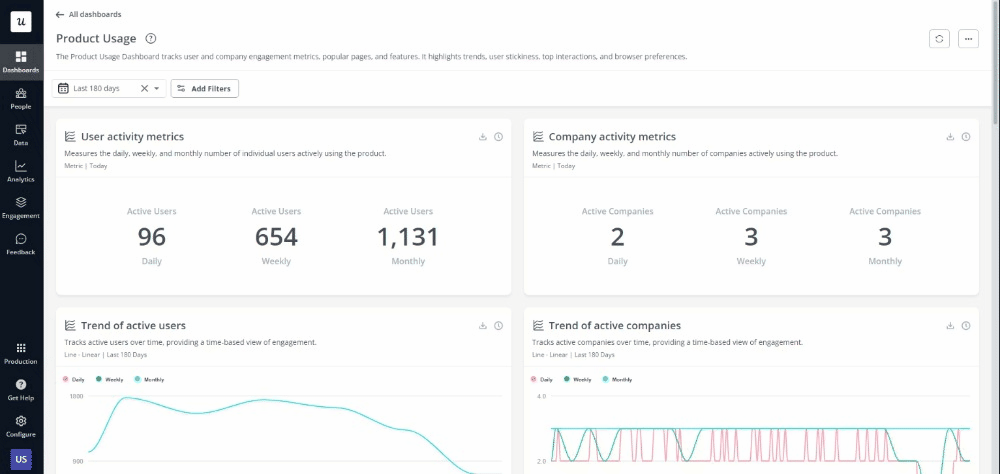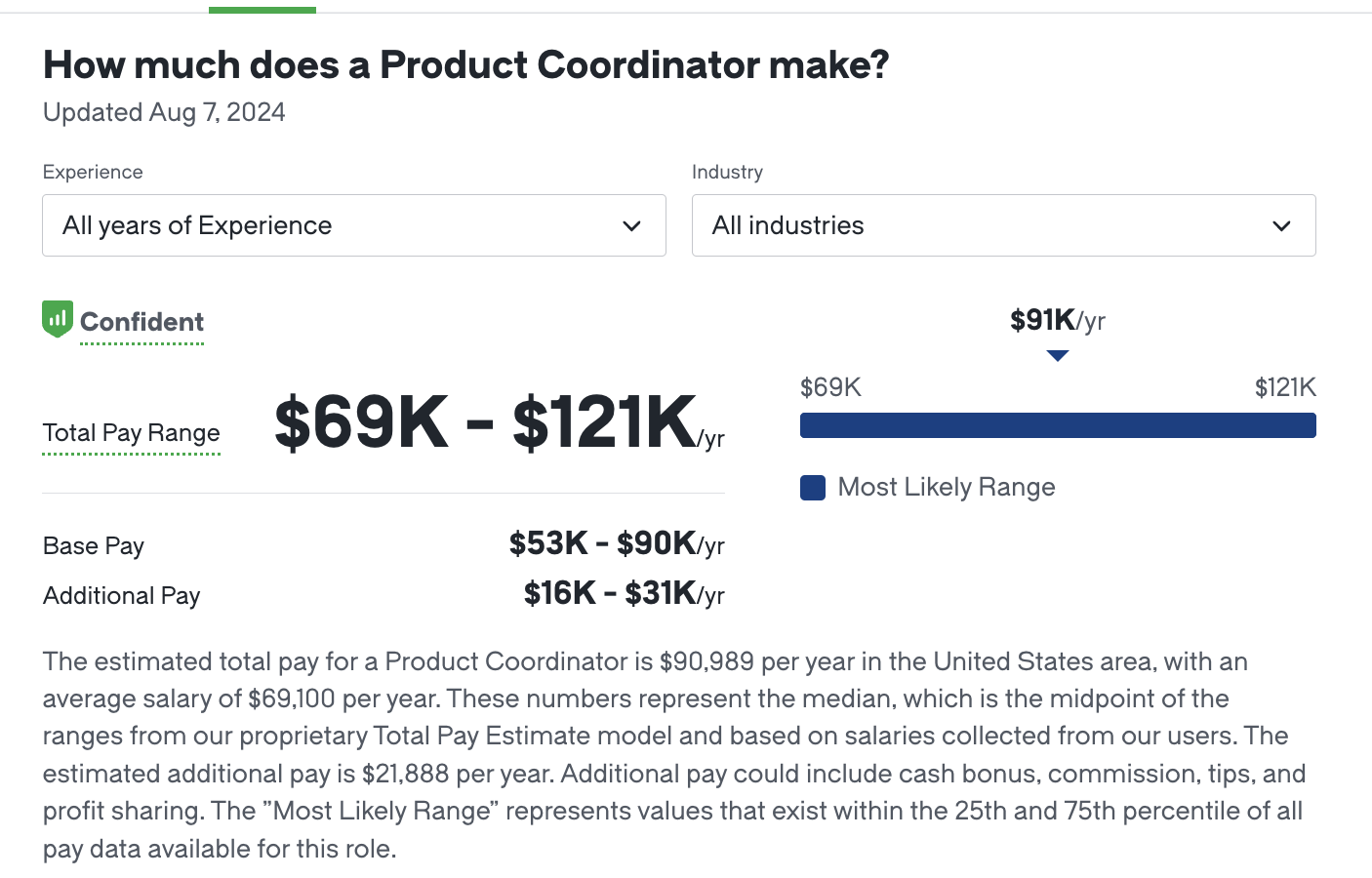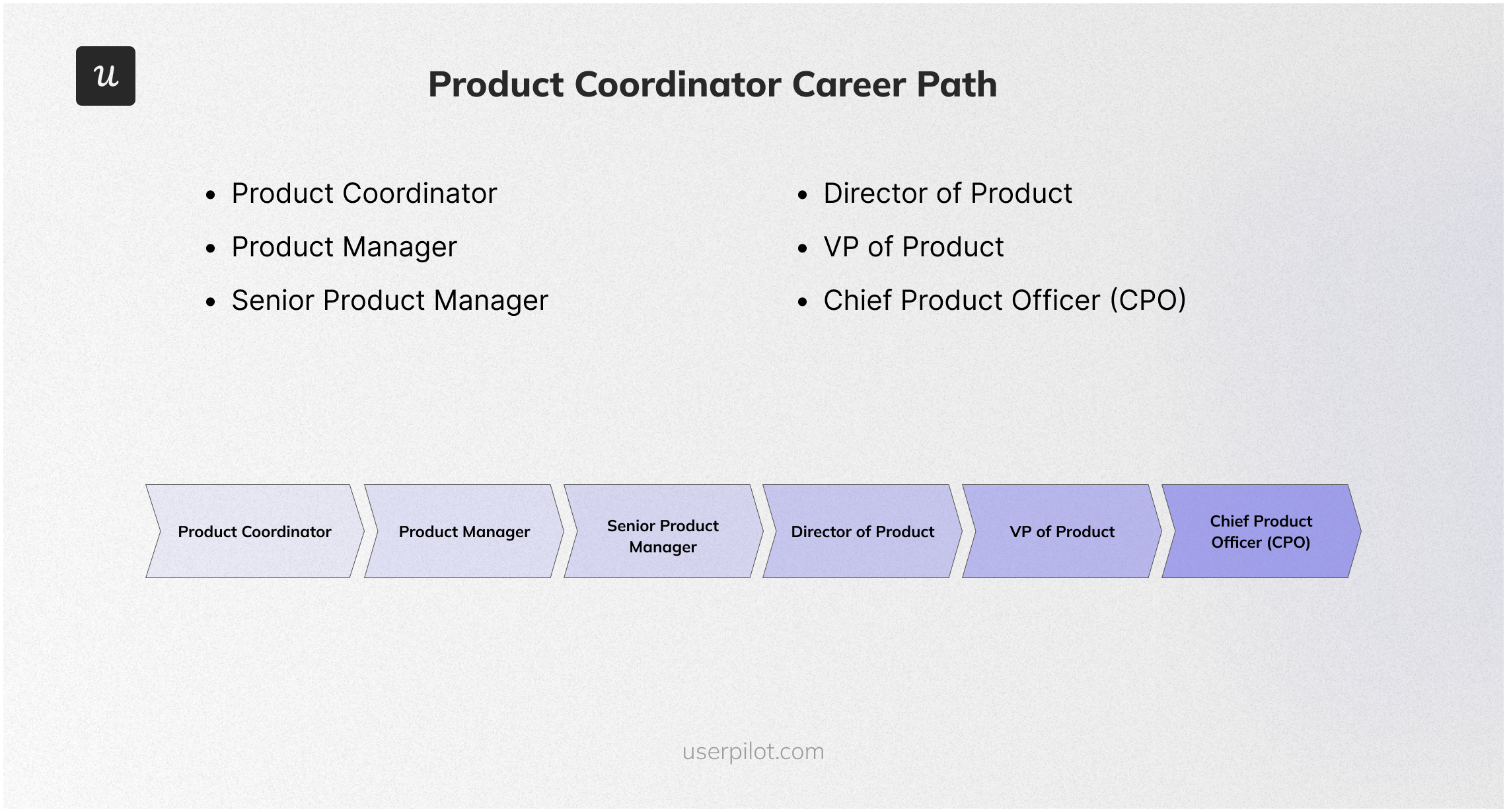
Starting a career as a product coordinator requires understanding the key steps, skills, and experiences needed for success.
In this article, we will outline the typical journey for product coordinators, covering educational requirements, entry-level positions, potential advancements, and long-term opportunities.
Without further ado, let’s get into it!
Try Userpilot Now
See Why 1,000+ Teams Choose Userpilot

TL;DR
- A product coordinator is a professional responsible for supporting the product team by managing various aspects of the product development process.
- Salaries differ based on several factors, most importantly on experience levels. Here’s a breakdown of salaries by years of experience:
- 2 to 4 years (Product Coordinator): $55,000 per year
- 5 to 7 years (Senior Product Coordinator): $70,000 per year
- 8+ years (Principal Product Coordinator): $85,000 per year
- Below is a detailed look at the typical career path, starting from a product coordinator position, and moving up through various roles:
- Product Coordinator
- Product Manager
- Senior Product Manager
- Director of Product
- VP of Product
- Chief Product Officer (CPO)
- Here’s a list of the top tools, each tailored to specific aspects of a product coordinator’s responsibilities:
- Best tool for user engagement and onboarding – Userpilot
- Best tool for project management – Jira
- Best tool for collaborative product management – Confluence
- Best tool for customer service management – Zendesk
- Best tool for customer success management – ClientSuccess
- Best tool for UX/UI design – Figma
- Best tool for data visualization and analysis – Tableau
- Looking into tools for product coordinators? Userpilot is an all-in-one product platform with engagement features and powerful analytics capabilities. Book a demo to see it in action!
What is a product coordinator?
A product coordinator is a professional responsible for supporting the product team by managing various aspects of the product development process.
In a SaaS environment, the role typically involves coordinating cross-functional teams and ensuring product features are delivered on time.
What does a product coordinator do?
The product coordinator acts as a liaison between development, marketing, and sales teams to streamline communication and ensure that the product meets both market needs and company objectives.
Other key duties include coordinating project timelines, tracking progress, and managing product documentation.
Product coordinator’s main responsibilities
The Product Coordinators work closely with various departments to align efforts and achieve company objectives, driving the product from concept to market success.
- Manage Project Timelines: Track project progress and deadlines to ensure products or features are delivered on schedule.
- Coordinate Cross-Functional Teams: Ensure seamless communication and collaboration between development, marketing, sales, and customer support teams.
- Conduct Market Research: Conduct thorough market research to identify emerging trends, market gaps, and potential product opportunities.
- Manage Customer Feedback: Gather and incorporate feedback from users to refine the product.
- Prepare Product Documentation: Create and maintain comprehensive product documentation, including user guides, release notes, and training materials.
- Manage Product Backlog: Help prioritize and manage the product backlog, ensuring that the most important tasks are addressed first. Also create product roadmaps, aligning with company goals and timelines.
- Support Product Launches: This can involve anything from creating promotional marketing materials to collaborating with the quality assurance team to ensure compliance.
- Monitor Product Performance: Track and report on product performance metrics to identify areas for improvement.
- Assist in Budget Management: Help manage the product development budget by tracking expenses and ensuring cost-effective use of resources.
- Educate internal teams on new features: Coordinate training sessions for sales and customer support teams after updates to ensure their knowledge is up to date.
- Maintain relationships with key stakeholders: Prepare regular status reports and updates for senior management.
- Improve working processes: Implement strategies to optimize product development processes and workflows.
Product coordinator salary
Salaries differ based on a number of factors, most importantly on experience levels. Here’s a breakdown of salaries by years of experience:
- 2 to 4 years (Product Coordinator): $55,000 per year
- 5 to 7 years (Senior Product Coordinator): $70,000 per year
- 8+ years (Principal Product Coordinator): $85,000 per year
Industries where the demand for product coordinators is highest tend to be the same industries that pay the most on average. Finance, healthcare, consumer goods, and SaaS represent a significant portion of product coordinator job openings. Here are salaries, as reported by Glassdoor:
- Financial product coordinator: $65,000 per year
- Healthcare product coordinator: $62,000 per year
- Consumer goods product coordinator: $64,000 per year
- SaaS product coordinator: $70,000 per year
Where you live can have a big impact on how much you make as a product coordinator. As more companies employ a geographically dispersed workforce (including remote workers), it’s common for companies to offer location-based salaries.
According to Glassdoor, these are the midpoint salaries for product coordinators in the following large US cities:
- San Francisco: $80,000 per year
- New York: $75,000 per year
- Boston: $70,000 per year
- Washington, DC: $72,000 per year
- Chicago: $68,000 per year
Product coordinator career path
A career as a product coordinator offers a well-defined pathway for professional growth within the field of product management.
Below is a detailed look at the typical career path, starting from a product coordinator position, moving up through various roles, and how to progress at each stage.
- Product Coordinator: A product coordinator is responsible for supporting the product team by managing schedules, coordinating tasks, and ensuring communication between different stakeholders. To move beyond this entry-level position, focus on developing strong project management skills, understanding the product development lifecycle, and building effective communication channels within your team. Gain proficiency in tools like JIRA, Asana, or Trello, and seek opportunities to take on more responsibility within projects.
- Product Manager: Product managers take a more central role in defining the product strategy, roadmaps, and feature definitions for a product. Excelling as a product manager requires a deep understanding of customer needs and market trends and the ability to prioritize features based on business impact. Develop strong analytical skills, leadership qualities, and the ability to persuade stakeholders. Getting certified in Agile, Scrum, or Lean methodologies can also be beneficial.
- Senior Product Manager: Senior product managers oversee multiple product lines or more complex products, often guiding less experienced product managers. To advance to this level, demonstrate a track record of successful product launches and the ability to mentor junior team members. Focus on strategic thinking and influence, including developing business cases and ROI analyses.
- Director of Product: Product directors are responsible for the strategic direction of all products within a category or entire organization, managing a larger team of product managers. Moving into a director role requires extensive experience and success in product management, a strong understanding of the industry, and exceptional leadership skills. It’s also important to be adept at cross-functional collaboration and have a strong executive presence.
- VP of Product: The VP of Product oversees the entire product planning, aligning development with company-wide goals and market needs. Reaching the VP level involves not only having deep expertise in product management but also contributing to the overall business strategy. This role demands excellent leadership, strategic planning, and operational skills, along with the ability to drive results at the organizational level.
- Chief Product Officer (CPO): As a CPO, you hold a top executive role, making decisions that shape the future of the organization’s products and overall business direction. This position is typically achieved by those with a successful track record in various senior product roles, complemented by strong business acumen and the ability to adapt to fast-changing environments. Building a robust network and maintaining a visionary outlook on the product and market trends is crucial in this position.
How to become a product coordinator
The path to becoming a product coordinator involves building a solid educational foundation, acquiring relevant skills, and gaining practical experience.
Let’s explore how you can prepare yourself for this role and make your mark in the world of product development.
- Obtain Relevant Education: A relevant educational foundation is the first step. Most product coordinators have degrees in business, marketing, or even fields like engineering or computer science, depending on the industry. Some go on to pursue MBA degrees to gain a competitive advantage, even though it’s not a must.
- Get Certified: Consider obtaining certifications that can further boost your credentials and help you stand out among other professionals. Examples of these can be certifications in project management (PMP), Agile (CSM), or product management.
- Develop Necessary Skills: Acquire skills crucial for a product coordinator, including:
- Technical Skills: Proficiency in project management software (like JIRA or Asana) and understanding basic data analysis.
- Soft Skills: Strong communication, organization, and time management skills.
- Build a Network: Networking can lead to mentorship opportunities and job leads, so be sure not to neglect this critical aspect. Connect with professionals in the field through networking events, LinkedIn, and industry conferences.
- Gain practical experience through internships: Look for internships in business, marketing, or product development. This will help you understand the basics of product lifecycle, customer research, and project management.
- Apply for Jobs: Start applying for product coordinator roles. Tailor your resume to highlight relevant skills and experiences that align with the job descriptions. Practice answering common interview questions related to project management and product development.
- Continue Learning: Once you land a role, keep learning and adapting. The field of product management is dynamic, and continuous learning will help you advance to higher roles.
Best resources for product coordinators
Product coordinators play a pivotal role in the lifecycle of a product, from conception through launch and beyond.
To excel in this multifaceted position, staying informed and continuously honing one’s skills are crucial.
Whether it’s through insightful blogs, engaging podcasts, educational webinars, or authoritative books, a well-rounded repository of resources can significantly impact a product coordinator’s effectiveness.
Here, we explore a curated list of the best resources across various mediums that every product coordinator should consider to stay ahead in their field.
Best books for product coordinators
One way to enhance your skills and knowledge as a product coordinator is through insightful literature tailored to the unique demands of your role.
Here are some must-read books that offer a blend of practical strategies, proven methodologies, and innovative insights specifically designed to empower product coordinators to master the operations side of product management.
- Making Things Happen: Mastering Project Management” by Scott Berkun: Focused on the practical aspects of project management that are applicable to product operations, this book offers insightful tips on leadership and dealing with day-to-day challenges.
- “Product Leadership: How Top Product Managers Launch Awesome Products and Build Successful Teams” by Richard Banfield, Martin Eriksson, and Nate Walkingshaw: This guide dives into the leadership aspect of product management, focusing on how to lead teams and manage the operational challenges that come with bringing a product to market.
- “Inspired: How to Create Products Customers Love” by Marty Cagan: Marty Cagan discusses the intersection of technology, business, and user experience, offering a deep dive into how product managers can align these elements to enhance product operations.
- “Lean Analytics: Use Data to Build a Better Startup Faster” by Alistair Croll and Benjamin Yoskovitz: For product coordinators looking to leverage data in decision-making, this book offers a blueprint for measuring and analyzing what really matters in products to improve them continuously.
- Managing Product = Managing Tension” by Marc Abraham: This book provides insights into the pressures and challenges of product management, offering strategies for balancing various aspects of the job to ensure effective product outcomes and operational success.
Best webinars for product coordinators
Staying updated on the latest trends and best practices is crucial for customer engagement managers. These platforms and events offer valuable webinars that cover a wide range of topics, from customer success strategies to product adoption tactics:
- Userpilot Events: Keep an eye on our events page for our own webinars, with talks often covering topics like in-app experiences, onboarding, and product adoption strategies.
- Product-Led Growth Webinars by OpenView: OpenView offers webinars focusing on the product-led growth model, where the product itself drives customer acquisition, conversion, and expansion. These are invaluable for product coordinators working in SaaS or any software-centric company.
- AMA’s (American Management Association) Webinars: While not exclusively for product management, AMA’s webinars provide broader business insights that can help product coordinators better understand leadership, strategic planning, and operational efficiency.
- AIPMM (Association of International Product Marketing and Management) Webinars: AIPMM provides webinars that cover comprehensive topics in product management and marketing management.
- Forrester and Gartner Webinars: Both Forrester and Gartner offer webinars that explore current trends, technology, and strategies in the product management space. These are ideal for coordinators in tech-heavy industries looking to stay ahead of the curve with up-to-date research and forecasts.
Best blogs for product coordinators
For product coordinators seeking to expand their knowledge and stay updated with the latest trends in product management and operations, here are eight highly recommended blogs:
- Userpilot Blog: This blog is a fantastic resource for product coordinators, offering in-depth articles and case studies on user onboarding, product adoption, and customer retention.
- Mind the Product: This is one of the largest communities of product people globally, offering insightful articles, case studies, and industry trends.
- ProductCoalition: A medium publication that serves as a community resource for all things product management. It features a wide array of articles from different authors around the world, covering topics from UX design to product marketing and operations.
- Silicon Valley Product Group (SVPG) Blog: Founded by Marty Cagan, a highly respected figure in the product management field, the SVPG blog provides in-depth articles on product strategy, design, and leadership.
- The Product Guy: Run by Jeremy Horn, this blog offers straightforward, often technical insights into PM. It’s particularly useful for those who enjoy a detailed, analytical approach to product issues and solutions.
Best podcasts for product coordinators
Podcasts are a great way for product coordinators to stay informed and inspired by the latest trends in product management and operations.
Here are some podcasts that are highly regarded in the industry for their valuable content:
- Product Love: This podcast explores the intersection of product management and love — essentially how and why creators are passionate about their products. It features interviews with product leaders who share their experiences and lessons in creating products users love.
- This is Product Management: Hosted by Mike Fishbein, this podcast delves into the various facets of product management. Each episode features an interview with a thought leader in the product field, discussing specific challenges and innovative strategies in product development.
- The Product Podcast: By Product School, this podcast features interviews with product management professionals from companies like Google, Facebook, and Spotify. It covers a range of topics, from product design to advanced product management strategies.
- Masters of Scale with Reid Hoffman: Although not exclusively about product management, this podcast offers valuable insights into scaling businesses, with stories from leading entrepreneurs and business owners.
- 100 PM: This podcast offers insights from top product managers across various industries. It’s particularly useful for product coordinators looking to gain diverse perspectives on product management and to understand different industry practices.
Best tools for product coordinators
Utilizing the right tools can help product coordinators drastically improve efficiency and streamline operations.
Here’s a list of the top 10 tools, each tailored to specific aspects of a product coordinator’s responsibilities:
- Best tool for user engagement and onboarding – Userpilot: Userpilot helps drive user engagement and product adoption by enabling non-technical team members to craft personalized in-app experiences and onboarding flows.
- Best tool for project management – Jira: Widely used in software development, Jira is excellent for tracking issues and tasks. Its robust workflow features and integration capabilities make it a top choice for managing complex product development cycles.
- Best tool for collaborative product management – Confluence: This tool serves as a central hub for keeping your team aligned. With Confluence, you can create, share, and collaborate on projects in a highly organized and accessible way.
- Best tool for customer service management – Zendesk: Zendesk allows product coordinators to streamline customer service processes and improve customer satisfaction. Zendesk consolidates customer interactions from various channels into a single platform, allowing support teams to respond efficiently through an organized ticketing system.
- Best tool for customer success management – ClientSuccess: This tool offers comprehensive features for monitoring customer health scores, managing renewals, and orchestrating successful customer journeys, crucial for maintaining high customer retention.
- Best tool for UX/UI design – Figma: Figma shines in facilitating collaborative design, with powerful features that allow multiple users to work on the same project simultaneously, making it essential for product design teams.
- Best tool for data visualization and analysis – Tableau: For product coordinators who need to make data-driven decisions, Tableau provides extensive capabilities for creating interactive and shareable analytics dashboards.
- Best tool for agile project management – Asana: Asana helps teams plan, organize, and track work across projects effectively. Its user-friendly interface and project views are perfect for maintaining agile workflows.
- Best tool for document collaboration – Notion: Notion is versatile, combining notes, tasks, databases, and wikis in one tool, making it perfect for managing documents, meeting notes, and project timelines in a unified space.
- Best tool for customer feedback – HubSpot Service: This tool not only helps manage customer interactions but also integrates customer feedback directly into the product development process, ensuring that user insights are translated into actionable improvements.
Conclusion
We hope our article has given you a good overview of the career path for product coordinators.
Whether you’re just starting out or looking to advance, the key is to stay curious, keep learning, and remain open to new opportunities along the way.
Looking into tools for product coordinators? Userpilot is an all-in-one product platform with engagement features and powerful analytics capabilities. Book a demo to see it in action!










